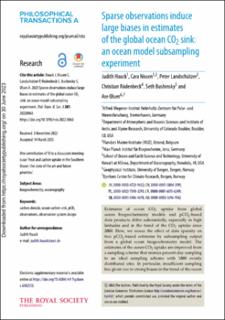| dc.contributor.author | Hauck, Judith | |
| dc.contributor.author | Nissen, Cara | |
| dc.contributor.author | Landschützer, Peter | |
| dc.contributor.author | Rödenbeck, Christian | |
| dc.contributor.author | Bushinsky, Seth | |
| dc.contributor.author | Olsen, Are | |
| dc.date.accessioned | 2023-07-03T11:28:03Z | |
| dc.date.available | 2023-07-03T11:28:03Z | |
| dc.date.created | 2023-06-14T13:23:07Z | |
| dc.date.issued | 2023 | |
| dc.identifier.issn | 1364-503X | |
| dc.identifier.uri | https://hdl.handle.net/11250/3075350 | |
| dc.description.abstract | Estimates of ocean CO2 uptake from global ocean biogeochemistry models and pCO2-based data products differ substantially, especially in high latitudes and in the trend of the CO2 uptake since 2000. Here, we assess the effect of data sparsity on two pCO2-based estimates by subsampling output from a global ocean biogeochemistry model. The estimates of the ocean CO2 uptake are improved from a sampling scheme that mimics present-day sampling to an ideal sampling scheme with 1000 evenly distributed sites. In particular, insufficient sampling has given rise to strong biases in the trend of the ocean carbon sink in the pCO2 products. The overestimation of the CO2 flux trend by 20–35% globally and 50–130% in the Southern Ocean with the present-day sampling is reduced to less than 15% with the ideal sampling scheme. A substantial overestimation of the decadal variability of the Southern Ocean carbon sink occurs in one product and appears related to a skewed data distribution in pCO2 space. With the ideal sampling, the bias in the mean CO2 flux is reduced from 9–12% to 2–9% globally and from 14–26% to 5–17% in the Southern Ocean. On top of that, discrepancies of about 0.4 PgC yr−1 (15%) persist due to uncertainties in the gas-exchange calculation. | en_US |
| dc.language.iso | eng | en_US |
| dc.publisher | The Royal Society | en_US |
| dc.rights | Navngivelse 4.0 Internasjonal | * |
| dc.rights.uri | http://creativecommons.org/licenses/by/4.0/deed.no | * |
| dc.title | Sparse observations induce large biases in estimates of the global ocean CO2 sink: An ocean model subsampling experiment | en_US |
| dc.type | Journal article | en_US |
| dc.type | Peer reviewed | en_US |
| dc.description.version | publishedVersion | en_US |
| dc.rights.holder | Copyright 2023 the authors | en_US |
| dc.source.articlenumber | 20220063 | en_US |
| cristin.ispublished | true | |
| cristin.fulltext | original | |
| cristin.qualitycode | 2 | |
| dc.identifier.doi | 10.1098/rsta.2022.0063 | |
| dc.identifier.cristin | 2154479 | |
| dc.source.journal | Philosophical Transactions of the Royal Society A: Mathematical, Physical and Engineering Sciences | en_US |
| dc.identifier.citation | Philosophical Transactions of the Royal Society A: Mathematical, Physical and Engineering Sciences. 2023, 381 (2249), 20220063. | en_US |
| dc.source.volume | 381 | en_US |
| dc.source.issue | 2249 | en_US |

